One midnight in late winter, at age 13, I rose stealthily from my bed. Moving quietly so as not to wake my parents and three brothers, I removed a leather box from the storage cabinet built into my wall. It was filled with jewelry, watches, pens, and savings bonds—thousands of dollars’ worth of gifts. They had been given to me that summer for my bar mitzvah.
For a long time, I had marveled at these riches, great wealth for a boy in the 1960s, even in the well-to-do suburb in which I lived. From time to time, I would open the box and arrange the jewelry in its compartments, touching the rattling identity bracelets, tie pins, and cufflinks. I would silently estimate the value of the haul.
But over time, that pleasure soured and died. The truth was, I had hated my bar mitzvah. The majesty and profundity of the Jewish coming-of-age ceremony—the majesty and profundity of Judaism itself—were lost on me. Or rather, they had never been instilled in me, for the simple reason that my parents did not believe in God.
My homemaker mother was, to the day she died, as certain an atheist as I have ever met. My father, an antic radio comedian, hedged his bets a little: it was not in his nature to defy a Gigantic Invisible Jew who could give you cancer just by thinking about it. Both my parents acknowledged that they had schooled my brothers and me in Jewish practices only in service to tradition. Their motivations were racial loyalty and religious guilt, not bringing us closer to the divine. Despite our dutiful celebration of Jewish holidays, God had no living presence in our family. We did not say grace before meals or prayers before bedtime. We did not read the Bible at home or discuss morality in terms of God’s nature or his will.
This rendered our Jewish observances absurd. Hebrew school, synagogue, the whole magnificent 4,000-year-old structure of Jewish theology and tradition: Without God, what was it but an empty temple, its foundations resting on nothing, its spires pointing only toward the dark?
Done with Hypocrisy
I was a boy who insisted that ideas, philosophies, even my daydreams make sense. Before I could imagine myself as some great warrior or superhero, the fantasy needed a logical context. This was good training for a kid who would one day become a writer of adventure and suspense novels, but it also taught me that words and thoughts should have integrity. I could not rid myself of the notion that when I stood at the synagogue podium for my bar mitzvah, when I declared myself a member of the Jewish faith, I was lying, betraying my deepest sense of self.
Why did I speak words I did not believe? Why did I sing those Hebrew prayers I did not even understand? And so, that winter night, after my parents and brothers had gone to bed, I crept quietly outside with the leather box full of riches.
There, beneath the kitchen window, beside the cellar door, two garbage receptacles were sunk into a concrete platform. I knelt, feeling the rough, cold cement through the knees of my pajamas. I pressed the foot pedal to raise the lid. With my other hand, I stuffed the box into a paper trash bag sodden with coffee grounds and egg shells. I worked it deep into the debris so that it would not be discovered before the garbage men came in the morning.
With this gesture, I hoped to leave behind not only Judaism but religious life entirely. No more hypocrisy and empty show. For most of the next 35 years, I remained a philosophical agnostic and a practical atheist. No shock of revelation changed me either. I never saw a flash of light like Paul on the road to Damascus. I never heard a voice telling me to “take up and read” like Augustine under the fig tree. Jesus never appeared to me while I lay drunk in the gutter.
And yet, looking back on my life, I see that Christ was beckoning to me at every turn. When I was a child, he was there in the kindness of a Christian babysitter and the magic of a Christmas Eve spent at her house. When I was a troubled young man contemplating suicide, he was in the voice of a Christian baseball player who gave a radio interview that inspired me to go on. And always, he was in the day-to-day miracle of my marriage, a lifelong romance that taught me the reality of love and slowly led me to contemplate the greater love that was its source and inspiration.
The Joy of My Joy
But perhaps most important for a novelist who insisted that ideas should make sense, Christ came to me in stories. Slowly, I came to understand that his life, words, sacrifice, and resurrection formed the hidden logic behind every novel, movie, or play that touched my deepest mind.
I was reading a story when that logic finally kicked in. I was in my 40s, lying in bed with one of Patrick O’Brian’s great seafaring adventure novels. One of the characters, whom I admired, said a prayer before going to sleep, and I thought to myself, Well, if he can pray, so can I. I laid the book aside and whispered a three-word prayer in gratitude for the contentment I’d found, and for the work and people I loved: “Thank you, God.”
It was a small and even prideful prayer: a self-impressed intellectual’s hesitant experiment with faith. God’s response was an act of extravagant grace.
I woke the next morning and everything had changed. There was a sudden clarity and brightness to familiar faces and objects; they were alive with meaning and with my own delight in them. I called this experience “the joy of my joy,” and it came to me again whenever I prayed. Naturally I began to pray every day. And over time, this joy of my joy became a constant companion: a steady sense of vitality and beauty that endured even in periods of sorrow and pain.
I was living in the beautiful Southern California town of Santa Barbara when I realized that prayer—that God—had transformed my life utterly, giving me a depth and pleasure of experience I had never known. I drove up into the hills one day, and with the forest and the city and the sea rolling by my windows, I asked God, “How can I thank you for what you’ve done for me? What could I possibly offer you in return?”
And as clearly as if he had spoken aloud, God answered, “Now, you should be baptized.”
I was stunned. Nothing could have been further from my mind. I was a man of the coasts and cities, at home among the snarks and cynics of postmodern times. I was a realist who believed in science and reason; a worldling who loved sex, violent movies, politics, and a good single malt scotch. I was—I am—proud of my Jewish heritage. I feared that becoming a Christian would estrange me from my past, my parents, my culture, and from reality itself.
I was not thinking about sin and redemption, not yet. I was not worried about heaven and hell. Having a personal relationship with Jesus was only a faint suggestion of a thought. No, all I wanted was to know the truth about the world, about this god who had done so much for me.
Over the following months, I realized that the voice that had spoken into my heart knew me better than I knew myself. Whatever problems it would cause with my family and friends, whatever difficulties it would bring in my career, I knew I had to be baptized.
My bar mitzvah had been an empty ritual, devoid of God—and truth. But my baptism was the outward expression of a deep and authentic inner conviction.
The moment I rose from my knees by the baptismal font, I knew I had stepped through some invisible barrier between myself and a remarkable new journey. Within a week or so, my wife noticed it too: a new joy and easiness.
My soul had found its northern star. And that star still leads me on.
Andrew Klavan is the author of The Great Good Thing: A Secular Jew Comes to Faith in Christ (Thomas Nelson).











